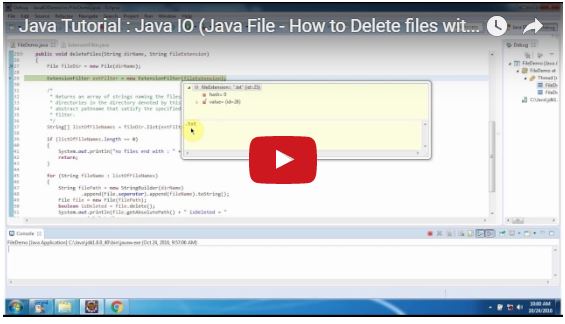Click here to watch in Youtube :
https://www.youtube.com/watch?v=B4-wxOUn9VQ&list=UUhwKlOVR041tngjerWxVccw
Click the below Image to Enlarge
 |
| Java Tutorial : Java IO (Java File - How to Delete files with certain extension only - V1) |
 |
| Java Tutorial : Java IO (Java File - How to Delete files with certain extension only - V1) |
import java.io.File; import java.io.FilenameFilter; /* * boolean accept(File dir, String name) * * Parameters: * ---------- * * dir - the directory in which the file was found. * name - the name of the file. */ public class ExtensionFilter implements FilenameFilter { private String fileExtension; public ExtensionFilter(String fileExtension) { this.fileExtension = fileExtension; } /* * Tests if a specified file should be included in a * file list. * * Returns: true if and only if the name should be * included in the file list; false otherwise. */ @Override public boolean accept(File dir, String name) { return (name.endsWith(fileExtension)); } }FileDemo.java
import java.io.File; /* * public String[] list(FilenameFilter filter) * * Parameters: * ---------- * * filter - A filename filter * * How to use FilenameFilter to list out all files that * are end with “.txt” extension in folder “D:/work“, * and then delete it. */ public class FileDemo { public static void main(String[] args) { FileDemo fileDemo = new FileDemo(); fileDemo.deleteFiles("D:/work", ".txt"); } public void deleteFiles(String dirName, String fileExtension) { File fileDir = new File(dirName); ExtensionFilter extFilter = new ExtensionFilter(fileExtension); /* * Returns an array of strings naming the files and * directories in the directory denoted by this * abstract pathname that satisfy the specified * filter. */ String[] listOfFileNames = fileDir.list(extFilter); if (listOfFileNames.length == 0) { System.out.println("no files end with : " + fileExtension); return; } for (String fileName : listOfFileNames) { String filePath = new StringBuilder(dirName) .append(File.separator).append(fileName).toString(); File file = new File(filePath); boolean isDeleted = file.delete(); System.out.println(file.getAbsolutePath() + " isDeleted = " + isDeleted); } } }Output
D:\work\Hello.txt isDeleted = true
D:\work\Java.txt isDeleted = true
Click the below link to download the code:
https://sites.google.com/site/ramj2eev1/home/javabasics/JavaIODemo_File_delete_ext_App.zip?attredirects=0&d=1
Github Link:
https://github.com/ramram43210/Java/tree/master/BasicJava/JavaIODemo_File_delete_ext_App
Bitbucket Link:
https://bitbucket.org/ramram43210/java/src/a3d05269db9922e504bb1f9de8d07031990c9910/BasicJava/JavaIODemo_File_delete_ext_App/?at=master
See also:


No comments:
Post a Comment